World Players leaders stand with Australian cricketers in contract dispute

Don Fehr, president of the World Players Association and Executive Director of the National Hockey League Players Association (NHLPA), and World Players Executive Director Brendan Schwab have both expressed their support for the Australian cricketers in their ongoing contract dispute. On separate occasions Fehr and Schwab appeared on “The Ticket”, a sports panel program by ABC News Radio, providing their assessment of the situation.
The Australian Cricketers’ Association (ACA), a member of the World Players Association through its affiliation to the Federation of International Cricketers’ Associations (FICA), is embroiled in a grave dispute with Cricket Australia (CA) over the retention of the revenue-sharing model that has successfully served the players and the game for almost 20 years. The memorandum of understanding between the two parties expired on 30 June rendering some 230 male and female cricketers unemployed. Meanwhile, the ACA has set aside funds to help players pay their bills if needed. A comprehensive statement outlining the position of the players and the chronology of the dispute is available here.
On “The Ticket” Don Fehr, who prior to his engagement with the NHLPA led the Major League Baseball Players Association for almost 25 years, shared his vast experience regarding the dynamics of player disputes.
"Management, ownership, makes a simple calculation: 'Am I more likely to get lower prices if I isolate the individuals and negotiate one on one, especially if they are young and not financially sophisticated, or is it more beneficial for me if I negotiate with the union which has professional staff, who know what they're doing, where the players can bargain together and make the bargaining power more equal'," said Fehr, who has been involved in numerous strikes and lock-outs throughout his career.
Elite players, continued Fehr, are irreplaceable in the delivery of any world class sport product. Therefore, the players individually, but far more importantly as a group enjoy considerably more bargaining power than most employees in other industries.
“Nobody goes to watch the referee, nobody goes to watch the trainer on the sideline and nobody, for sure, goes to watch anybody who's wearing a suit and tie.”
During his interview Brendan Schwab warned against the erosion of Australia’s long-standing model of player relations which has seen Australia’s major professional team sports prosper on the field and as businesses over the last 20 years.
“The emergence of the Australian player associations in the 1990s has brought enormous stability and growth to Australian sport by ending two decades of frequent player rights litigation and economic crises,” Schwab said. “Collective bargaining has created a partnership between the players and sport which sees the players receive a relatively low share of revenue by international standards (25-30%) so that Australia’s not for profit sports governing bodies can invest in the overall development of the game. That growth in revenue - which the players generate through their performances and marketability – not only benefits players but all of sport’s stakeholders.
“It would be very consequential if the Australian model of partnership was to be replaced with one based on power and leverage. In industrial relations, the parties need to take a long-term approach and it is worrying to see that Cricket Australia doesn’t seem to heed the positive long-term effects of a fair revenue-sharing model.”
The World Players Association applauds the determination and solidarity of the Australian cricketers to fight for their fair share and reiterates its full support.

